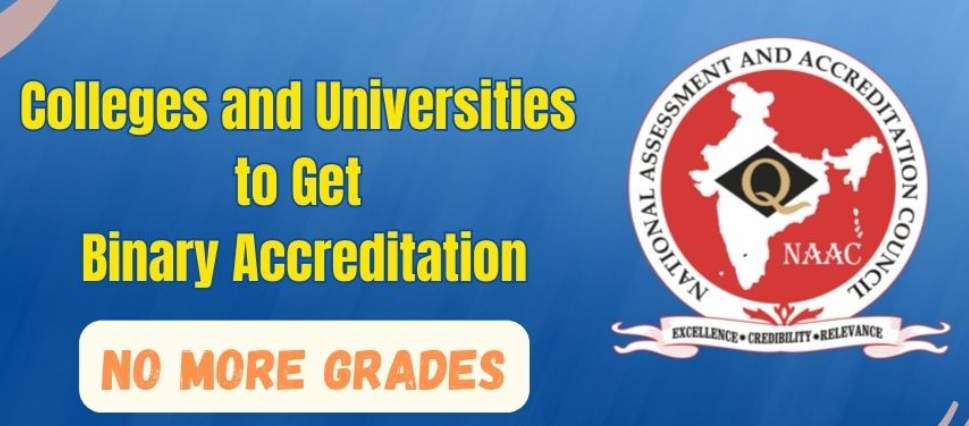NAAC's Educational Revolution: Bid Farewell to Grades, Embrace Binary and Multi-Level Accreditation

National Assessment and Accrediting Council (NAAC), India’s main higher education accrediting body, revealed a new certification system that would alter the sector. The January 2024 announcement replaced eight-point grading with binary and multi-level accreditation.
On January 27, 2024, the National Assessment and Accreditation Council (NAAC) made a groundbreaking decision in its executive council meeting, changing how Indian higher education institutions are rated and acknowledged. Instead of grading, schools are either “accredited” or “not accredited.”

Saturday’s Ministry of Education (MoE) publication of the final ‘Reforms for Strengthening Assessment and Accreditation in Higher Education Institutions’ (HIE) report includes the change. A detailed report received public comment in May 2023 was presented to Union Minister of Education Dharmendra Pradhan and approved on January 16, 2024.

Old system
For years, the eight-point grading system was criticised for being excessively complicated and not distinguishing universities. Under the prior system, institutions received grades from A++ to C, with A++ being the best and C being the lowest.

The new system
A simpler and more visible binary and multi-level accrediting method is proposed. Institutions will be accredited or not under the new system. Level 5 will be the highest accrediting level, and Level 1 will be the lowest.
The new accrediting system should help schools and students. Institutions’ strengths and shortcomings will be evident under the new system. It will let them compare themselves to other universities and discover areas for improvement.
Students will learn more about the quality of schools they are considering under the new method. It will also inform their academic choices.


Key Recommendations
The report suggests a departure from the conventional grading system in favour of a binary accreditation system. This shift is designed to streamline the accreditation process, urging all institutions to actively participate. The two-stage implementation plan comprises the introduction of the binary system within the next four months and the subsequent rollout of a maturity-based graded accreditation system from December 2024.
The maturity-based graded accreditation introduces multiple levels of grading, ranging from Level 1 to Level 5. Accredited institutions are encouraged to elevate their standards continually, progressing from ‘Level 1’ to ‘Level 4’ as Institutions of National Excellence. The highest tier, ‘Level-5,’ designates institutions as Institutions of Global Excellence for Multi-Disciplinary Research and Education.

Some significant elements of the new accrediting system are:
- Binary accreditation: Institutions are accredited or not.
- The greatest level of certification is Level 5, while the lowest level is Level 1.
- Outcome-based assessment: The new approach will evaluate schooling results rather than inputs.
- Institutions will be categorised by type—university, college, or technical institute.
- Data transparency: The NAAC will provide more institutional data.
- Two stages are planned for the new accrediting system. The first step, implementing binary accreditation, should be completed by December 2024. The second phase, implementing the multi-level certification system, should finish in March 2025.
Implementation Timeline
The NAAC’s executive committee, in its 104th meeting on January 27, outlined the phased implementation plan. The binary accreditation system will be operational within the next four months, during which no new applications will be accepted under the existing methodology. Institutions applying during this period can choose between the current process and the new methodology.
The more intricate Maturity-based Graded levels are scheduled to be implemented by December 2024.

Holistic Approach to Accreditation
The report underscores a shift from an input-centric approach to an outcome-based one. Metrics for both binary and multi-level graded accreditation will focus on processes, outcomes, and impact, aligning with a commitment to transparency and continuous improvement.
Recognizing the diverse landscape of Higher Education Institutions (HEIs) in India, the new system categorizes them based on attributes such as orientation, heritage, and legacy, rejecting the outdated ‘one-size-fits-all’ model. A special emphasis is placed on institutions situated in rural and remote areas, addressing the need for inclusivity.
‘One Nation One Data’ Platform
In tandem with accreditation reforms, the Ministry has been developing the ‘One Nation, One Data’ platform to enhance the authenticity of data. This platform aims to capture a comprehensive set of data from HEIs, facilitating approval, accreditation, and ranking processes. The design incorporates built-in checks to ensure data authenticity and proposes stakeholder validation to integrate diverse perspectives into the accreditation and ranking process.
Challenges of the new system
The new accrediting system may potentially have issues. Institutions habituated to the previous system will face a substantial shift. The new method may be confusing to kids and parents.
Overall, the new accrediting system improves Indian higher education. It should make the system more open and responsible for institutions and students.
Future Outlook
The reforms align strategically with the Vision of the National Education Policy (NEP) 2020, embracing simplicity, trust, credibility, objectivity, and rationalization. The objective is to establish a technology-driven, transparent, and modern accreditation system that minimizes manual involvement. Additionally, there are provisions for customized rankings based on stakeholders such as industry, funding agencies, and students.
Finally, these radical improvements would lift Indian higher education institutions to a worldwide level. Modern, technology-driven processes and the NAAC’s forward-thinking approach offer a more transparent, inclusive, and trustworthy certification process for students, professors, and other higher education stakeholders.






